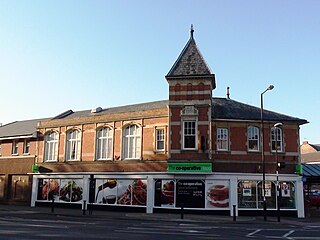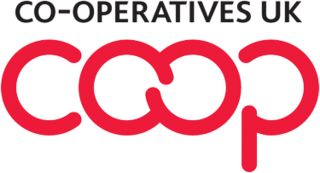
A cooperative is "an autonomous association of persons united voluntarily to meet their common economic, social and cultural needs and aspirations through a jointly owned and democratically-controlled enterprise". Cooperatives are democratically controlled by their members, with each member having one vote in electing the board of directors. They differ from collectives in that they are generally built from the bottom-up, rather than the top-down. Cooperatives may include:
The Co-operative Party is a centre-left political party in the United Kingdom, supporting co-operative values and principles. The party currently has an electoral pact with the Labour Party. Established in 1917, the Co-operative Party was founded by co-operative societies to campaign politically for the fairer treatment of co-operative enterprise and to elect 'co-operators' to Parliament. The party's roots lie in the Parliamentary Committee of the Co-operative Union established in 1881.
Richard John Adams is a British businessman and social entrepreneur. He is the founder of the UK fair trade organisations Tearcraft and Traidcraft and of a number of social enterprises which promote environmentally responsible and ethical business.

Dame Pauline Green, is a former Labour and Co-operative Member of the European Parliament and former Leader of the Parliamentary Group of the Party of European Socialists (PES). As leader of the Parliamentary Group of the PES, she had a central role in the controversy surrounding the failure to discharge the European Commission (EC)'s 1996 budget, bringing the first motion of censure against the commission but voting against it. She then changed her position following corruption allegations raised by EC official Paul van Buitenen to call for Jacques Santer to react promptly or be sacked. Green lost the leadership of the PES in 1999, which was attributed in part to her handling of the incident.

The Co-operative Group Limited, trading as Co-op and formerly known as the Co-operative Wholesale Society, is a British consumer co-operative with a group of retail businesses, including grocery retail and wholesale, legal services, funerals and insurance, and social enterprise.
A social enterprise is an organization that applies commercial strategies to maximize improvements in financial, social and environmental well-being. This may include maximizing social impact alongside profits for co-owners.

The New Economics Foundation (NEF) is a British think-tank that promotes "social, economic and environmental justice".

An industrial and provident society (IPS) is a body corporate registered for carrying on any industries, businesses, or trades specified in or authorised by its rules.
The Rochdale Society of Equitable Pioneers, founded in 1844, was an early consumers' co-operative, and one of the first to pay a patronage dividend, forming the basis for the modern co-operative movement. Although other co-operatives preceded it, the Rochdale Pioneers co-operative became the prototype for societies in Great Britain. The Rochdale Pioneers are most famous for designing the Rochdale Principles, a set of principles of co-operation, which provide the foundation for the principles on which co-ops around the world operate to this day. The model the Rochdale Pioneers used is a focus of study within co-operative economics.
The United Kingdom is home to a widespread and diverse co-operative movement, with over 7,000 registered co-operatives owned by 17 million individual members and which contribute £34bn a year to the British economy. Modern co-operation started with the Rochdale Pioneers' shop in the northern English town of Rochdale in 1844, though the history of co-operation in Britain can be traced back to before 1800. The British co-operative movement is most commonly associated with The Co-operative brand which has been adopted by several large consumers' co-operative societies; however, there are many thousands of registered co-operative businesses operating in the UK. Alongside these consumers' co-operatives, there exist many prominent agricultural co-operatives (621), co-operative housing providers (619), health and social care cooperatives (111), cooperative schools (834), retail co-operatives, co-operatively run community energy projects, football supporters' trusts, credit unions, and worker-owned businesses.

A consumers' co-operative is an enterprise owned by consumers and managed democratically and that aims at fulfilling the needs and aspirations of its members. Such co-operatives operate within the market system, independently of the state, as a form of mutual aid, oriented toward service rather than pecuniary profit. Many cooperatives, however, do have a degree of profit orientation. Just like other corporations, some cooperatives issue dividends to owners based on a share of total net profit or earnings ; or based on a percentage of the total amount of purchases made by the owner. Regardless of whether they issue a dividend or not, most consumers’ cooperatives will offer owners discounts and preferential access to goods and services.

Co-operatives UK is a British co-operative federation described as "the central membership organisation for co-operative enterprise throughout the UK". It was founded in 1870 as the Co-operative Central Board, changing its name to the Co-operative Union before finally becoming Co-operatives UK following its merger with the Industrial Common Ownership Movement (ICOM) in 2001. Historically associated with consumer co-operatives, the merger broadened its scope to include worker co-operatives and it now exists to support and promote the values of the entire co-operative movement throughout the UK.

Cooperativeeconomics is a field of economics that incorporates cooperative studies and political economy toward the study and management of cooperatives.
The history of the cooperative movement concerns the origins and history of cooperatives across the world. Although cooperative arrangements, such as mutual insurance, and principles of cooperation existed long before, the cooperative movement began with the application of cooperative principles to business organization.
Co-operative Banking Group Limited was a UK-based banking and insurance company and a wholly owned subsidiary of The Co-operative Group. Established in 2002, its head office was located at the CIS Tower, Miller Street, Manchester.
Peter Hunt is a British politician and co-operative activist and thinker. He was until March 2008 General Secretary of the Co-operative Party and is as of 2008 chief executive of the think tank Mutuo.
Mutuo is a British advocacy organisation and think tank that advocates mutuals and cooperatives. In anticipation of the 2010 general election, it published the Mutuals Manifesto, which was the subject of an early day motion in the House of Commons.

West Whitlawburn Housing Co-operative is a housing co-operative and registered social landlord on the outskirts of Glasgow, Scotland. Situated in Cambuslang the co-operative is a social housing provider managing 644 former council housing on the West Whitlawburn estate, housing approximately 2500 residents. As a fully mutual housing co-operative the tenants are members and shareholders and elect a management committee of members to oversee the running of the organisation. Founded in 1989 the co-operative is one of the largest housing co-operatives in Scotland, and one of the few stock transfer social housing co-operatives not to have been converted into a housing association.
Johnston Birchall (1951–2021) was a leading British academic in the field of co-operative studies and at the time of his death Professor Emeritus at the Social Science Faculty of the University of Stirling.









